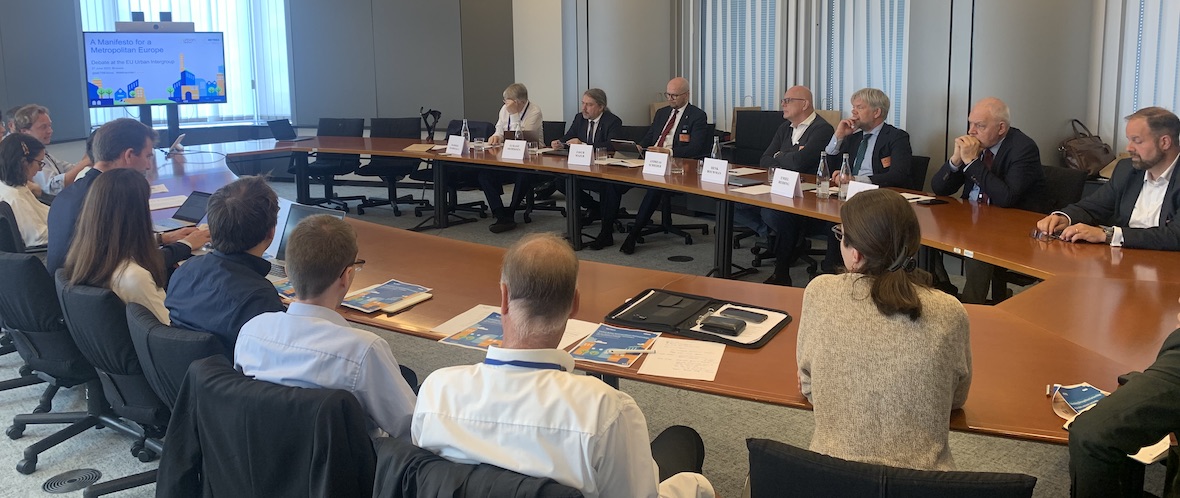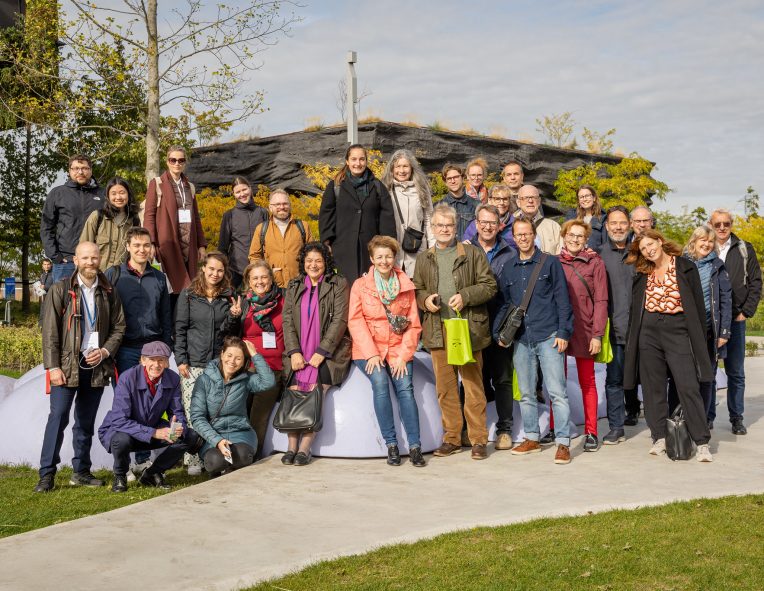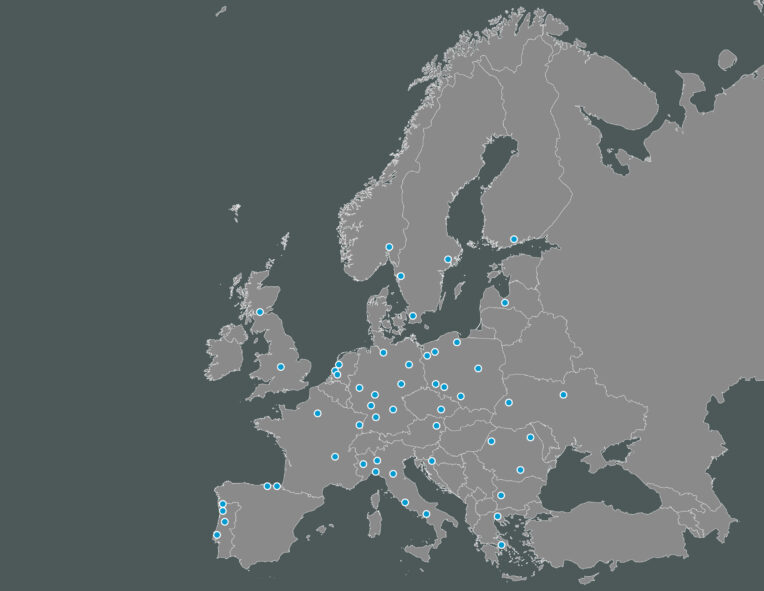Urban Intergroup meeting on the Manifesto for a Metropolitan Europe
On 27 June 2023, the Urban Intergroup welcomed METREX to an event to discuss a manifesto that it is developing to promote the concept of a new, metropolitan approach to Europe. METREX is a network of over 50 European metropolitan regions and areas and exists to share practical solutions to address local and regional challenges and aspirations.
MEP Andreas Scheider, Vice President of the Intergroup, introduced the event and highlighted the knowhow within the Intergroup in terms of urban and metropolitan issues. The Intergroup speaks often about the deep crises we are in, from finance and refugees through to Covid and the climate. Mr Scheider highlighted the intense and ongoing discussions that take place in the European Parliament on issues such as the Nature Restoration Law, and the impact of these changes on citizens.
Jakub Mazur, First Deputy Mayor of Wrocław and President of METREX, welcomed guests to this discussion which he said was critical to the future of cities, regions and the organisations that are shaping Europe. Mr Mazur spoke about the Manifesto in the context of the 27-year life span of METREX, during which Europe has changed significantly. The Manifesto, Mr Mazur said, is about presenting a new vision of Europe, that is supplemented with the metropolitan dimension.
Łukasz Medeksza, the Deputy Director of the City Development and Strategy Department for the City of Wrocław and Managing Committee Member of METREX, gave a briefing on the Manifesto and an introduction to metropolitan areas. With over 60 per cent of Europe’s population living in them, 70 per cent of Europe’s GDP generated in them, and 81 per cent of migrants choosing them as their destination, metropolitan areas are an important component in Europe’s DNA.
The metropolitan agenda is on the rise globally, demonstrated three weeks ago by the United Nations’ adoption of a resolution that underlines the role of metropolitan governance in addressing the Sustainable Development Goals. The resolution openly calls on national governments to strengthen the metropolitan dimension. This is what the Manifesto calls for in Europe. Above all, it is about urban and rural balance.
During the drafting of the Manifesto, the term “metropolitan partnerships” has been adopted to represent the “metropolitan state of mind”, which METREX says includes cross-border, multi-actor, multi-level approaches.
Within the Manifesto is a series of 12 demands. Six are aimed at the EU and include attaining a greater say on the direction of policies, a dedicated ‘metropolitan programme 2050’ in the MFF (Multi Financial Framework), and a Commissioner with Metropolitan Partnerships within their portfolio, amongst other things. The remaining six are aimed at national governments, which calls for capacity building and benchmarking, regulations to be adopted on things such as spatial planning, and national programmes dedicated to metropolitan regions and areas.
Markku Markkula, Vice President of the Committee of the Regions and President of the Helsinki-Uusimaa Region, spoke about how the Helsinki-Uusimaa region coordinates action in partnerships with the participating municipalities. Helsinki-Uusimaa has three measurable targets as a region: to hit carbon neutrality by 2030; reach 5 per cent GDP in research and development; raise employment to 80 per cent.
Mr. Markkula spoke about the metropolitan level taking on the role of ‘future planners’ to work out what sort of places are wanted, and what is required to deliver them. While the city is a platform tackle specific agendas such as the circular economy and data economy, the regional level is about collaboration between places to share and amplify the best instruments to reach the United Nations’ Sustainable Development Goals (SDGs).
Emiel Reiding, Secretary Director of the Metropolitan Region of Amsterdam (MRA), explained about the informal nature of the newly formed MRA, which is a collaboration of 30 municipalities, two regions and a transport authority. It is a voluntary agreement, but collaboration is growing. Their focus includes spatial planning, and within that some specific areas such as mobility, housing, industry and energy. Their goal is to create a sustainable economy. The size of these challenges necessitates that they work and think at a larger, metropolitan scale. When problems are intertwined, solutions should be too.
The informal nature of the MRA is an advantage and allows flexibility to incorporate differing goals between the partners. The MRA does not have any decision-making powers – this is left to the municipal level – but it does advise and influence direction. The importance of the MRA to its partners is demonstrated by the new addition of a permanent member of staff in Brussels.
Discussion with the audience
Greater collaboration
Mr. Markkula suggested that the scale of the challenges faced, and indeed the aspirations that are called for, will require greater collaboration. Whether it is Amsterdam’s move towards a circular economy, or Helsinki’s regional masterplan covering urban to rural areas, big transformations are required where multiple actors in the region, such as universities, can be mobilised.
It was questioned what type of stakeholders are being included and whether this has already extended to industries such as retail and wholesale, particularly as they will play a big role in actions on circularity. Metropolitan Partnerships such as the MRA can be described as a quadruple helix as it already includes society, industry, government, academia.
A fair and equitable system
It was questioned to what extent human rights features within the manifesto and therefore at the metropolitan level. In response, Mr. Mazur commented that reaching all SDGs, including human rights, is the foundation of the Manifesto. And behind this, social prosperity and equality is at the heart of the policies of all Europe’s Metropolitan Regions and Areas.
Mr. Mazur gave the example of his city Wrocław, which has welcomed 250.000 Ukrainian refugees, often learning in the moment what is required. The ability for Metropolitan Regions and Areas to respond to human rights is however decided at the national level. Defining ‘metropolitan citizenship’ is becoming a challenge, with circa 30 per cent of Wrocław’s population, who as Ukrainian immigrants are unable to vote, not having a say in city decision-making. This has a huge implication on not only service provision but also the making of a cohesive city.
Basic human rights are also linked to provision and access to vital services such as water, energy and food. This will become increasingly difficult as resources become ever scarcer. It was suggested that collaboration at the metropolitan scale – the ‘metropolitan partnership’ approach’ – can provide a fair approach to ecosystem management and thus avoid conflict.
Within this approach, collaboration between urban and rural areas will also play a big role in a fair and equitable system. Each has a role to play in providing what is collectively needed to sustain and enhance life; the rural area could provide water, food and energy, while the urban area can provide human capital and more concentrated services.
Spatial planning to solve big issues
How spatial planning – the likes of which is done at the metropolitan level – can be leveraged to address crises facing Europe is an issue being explored by Eurocities. METREX through the Manifesto was urged to look in particular at how spatial planning can be used to reach climate neutrality, a subject which the commentor believed that the metropolitan level can do more to address.
The right governance in the right place
A representative of the Covenant of Mayors questioned adding further levels of governance and stressed the importance of connection to national-level governance. Cities are often said to be in the driving seat in the response to challenges and therefore they need support. But they need the right conditions to scale and accelerate, which are often set at the national level. Effective legislation should therefore be set to enable more effective collaboration between all levels of governance. It was clarified that the Manifesto calls for better use of existing layers – not the addition of new layers. Helping each other by coordinating resources and bringing stronger collaboration.
As formal, or not, as required
Not all metropolitan regions and areas seek greater formalisation and Metropolitan Partnerships are about employing the right system for the partners involved and according to the goals at hand. Some will respond better to a formalised partnership, while others will work better within a looser structure. The MRA, for instance, has established an informal and flexible approach, where its role is to advise the partners on decisions, not take decisions itself. However, in the Italian context, a formal structure led to a national metropolitan programme, which otherwise would not have happened.
Metropolregion Rheinland supported the notion that installing a new layer of formal governance would not bring additional solutions. However, what is important is to provide a platform for many and diverse actors to work together towards solutions. Metropolitan Partnerships offer this and the possibility for playing a greater role in shaping Europe by offering views and solutions from both urban and rural areas.
Funding was raised as a potential issue with informality, where funders seek assurances from contracts and formal bodies. The METREX Secretary General called for help in defining the undefinable: to close the gap between tightly defining a project or partnership to win funding yet retaining informality. One answer, provided by Metropolregion Rheinland, was to establish a firm mandate as a region, backed by either a formal or informal partnership according to the context.
Metropolitan Partnerships are on a basic level also about pooling knowledge on how to work towards the SDGs. From different sectors, such as academia, the private sector and civil society. This link to the SDGs, including human rights, should be stressed in the Manifesto.
Specificity, realism and taking a risk on uniting big and small
Summing up the meeting, Jan Olbrycht MEP proposed the Urban Intergroup as a bridge to the European Parliament. In winning support for the Manifesto, Mr Olbrycht urged for the most appropriate and efficient tactics, rather than courting the ceremony that accompanies the European institutions.
Mr Olbrycht urged realism in terms of what the Manifesto calls for, and to be precise in terms of what it calls for. For example, the Manifesto promotes partnerships, rather than contracts. This is the more difficult approach, especially as is tried to marry big and small, urban and rural – and within this, different functions. However, this complex aspiration is what can set the Manifesto apart, by taking the risk to link big cities and rural areas. Afterall, everyone claims that this is an important goal, but no one is doing it.
Finally, Mr Olbrycht urged the Manifesto to focus on more than cohesion as this will only lead to a limited view and influence. A wider focus that includes all SDGs such as energy and climate will lead to greater impact. This point is especially true as in some member states, cohesion policy is simply not a priority.
METREX would like to thank the Urban Intergroup President, Mr Jan Olbrycht MEP, for hosting this meeting.
Programme
Moderation: Henk Bouwman, Secretary-General METREX
Jakub Mazur, President of METREX and First Deputy Mayor of Wrocław
Insights from Practice: Markku Markkula, Vice-President of the CoR and President of the Helsinki-Uusimaa Region
Insights from practice: Emiel Reiding, Director of the Metropolitan Region of Amsterdam (MRA)
This event is now at full capacity. To register for the waiting list, please contact Stephen Gallagher.



